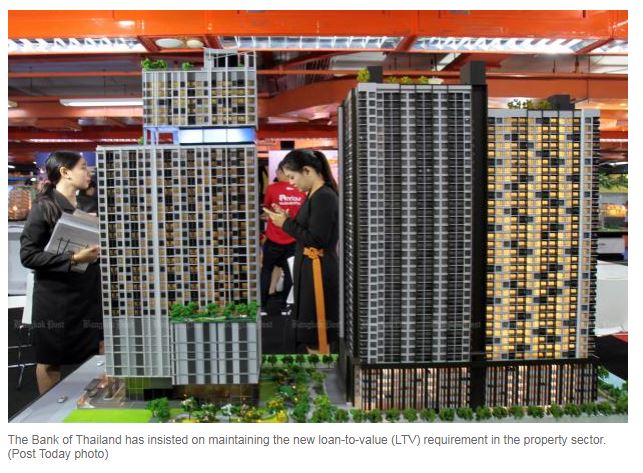Bank of Thailand to retain LTV regulation
Despite the Finance Ministry’s request to ease the new loan-to-value (LTV) requirement, the Bank of Thailand has insisted on maintaining the regulation, saying bad mortgages continued to climb for the three months through March and a further uptick is expected this quarter.
The bad-mortgage ratio is expected to keep rising in the second quarter, mainly because of strong loan growth before the regulation came into force, said Somchai Lertlarpwasin, senior director of the financial institutions strategy department at the central bank.
Mortgage non-performing loans (NPLs) rose to 3.35% of loans outstanding at the end of March from 3.25% at the end of last year, according to central bank data. Soured housing loans continued to increase over the past several years from 2.44% in 2015 to 2.93% in 2016, 3.23% in 2017 and 3.25% in 2018.
For the first quarter, 140 billion baht worth of home loans were extended, far above the average of 90 billion lent during the same period over the past 10 years.
The strong mortgage growth was spotted in the final quarter of 2018 when the central bank announced the stringent regulation, starting from April 1, 2019, to improve credit standards and contain swelling household debt and speculative activities.
“Mortgage NPLs tend to further increase in the second quarter, so the tightened LTV measures will remain in place,” Mr Somchai said.
GH Bank president Chatchai Sirilai said last week that the Finance Ministry was poised to ask the Bank of Thailand to ease new mortgage lending curbs following a considerable slump in housing loans after the curbs took effect.
Mr Somchai said the central bank typically relaxes regulations to support the government’s special loan packages offered to particular borrower segments, but the regulation is still needed for normal lending practice to standardise home loan extension.
The central bank’s new LTV measures do not dampen real demand in mortgages, especially from homebuyers who want to purchase first homes, he said.
The LTV measure requires a minimum down payment for third and subsequent mortgages of 30% of the home price, while the minimum down payment for a second housing loan is 10-20%, depending on how long a borrower has made payments on the first.
An LTV ratio of 80% is required in cases where a borrower buys a residence valued at 10 million baht or higher.
Mr Somchai said the central bank expects new mortgage lending during the third or fourth quarter to drop to 90-100 billion baht, a level typical of the past, while NPLs will start to decline.
Auto loans are another area the central bank is monitoring because of strong demand and high levels of bad loans. Auto NPLs increased to 1.71% of the total at the end of March from 1.66% at the end of last year.
The Bank of Thailand is examining such loans, finding that 70% of car loans were extended by banks and subsidiaries, with 30% from leasing firms, Mr Somchai said.
In 2018, vehicle loan growth stood at 10%, while auto refinance grew 30%.
Intensifying competition and promotional campaigns for loans are driving expansion in the sector. For instance, some auto lenders offer no down payment for 84 months of instalments and a one-hour loan approval process.
“We will study more details in sub-segment auto loans before making a decision as to whether new measures are needed,” Mr Somchai said.
Source: https://www.bangkokpost.com/business/finance/1681692/bank-of-thailand-to-retain-ltv-regulation


 English
English




